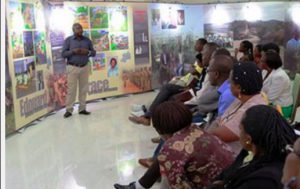… EDUCATION FOR PEACE …
An article from the Rwanda Focus
After three years of building sustainable peace in communities across the country, the Rwanda Peace Education Program (RPEP) is coming to a close. The conclusion of the program will be marked by a Peace Week that starts on Monday and will include various activities to share the success of the program and encourage all Rwandans to be champions of peace in their own villages and families.

(Click on photo to enlarge)
A peace-building event organized by RPEP. (photo RPEP)
The Peace Week will take place from Monday 20 to Saturday 25 June, and will be hosted at the Kigali Genocide Memorial, Iwacu Avenue (Car Free Zone) and the Institute for Research and Dialogue for Peace.
The major activities include: the Ubumuntu International Youth Conference; the Peace Makers Exhibition at Iwacu Avenue (Car Free Zone); the National School Arts Competition Exhibition at Iwacu Avenue (Car Free Zone); the First Generation Teacher Peace Competition at the Kigali Genocide Memorial; Musekeweya Arts Performance; and a USC Shoah Foundation Film Screening at the Kigali Genocide Memorial
As part of Peace Week, RPEP partner the Aegis Trust will organize the Ubumuntu International Youth Conference, bringing together more than 100 young peace-builders from 16 countries. Participants will learn about genocide and its effects, post-genocide reconstruction, and genocide prevention. They will also visit memorials and reconciliation villages, and hear from leading scholars and practitioners in the areas of conflict resolution, conflict prevention, and peace building.
The Peace Week aims to inspire and challenge Rwandans to become peacemakers in their own communities. Rwandans who have used their skills and talents to influence their peers and communities to contribute to building a Rwanda that is free from conflict and division will share their experiences.
RPEP has been in place for the last three years, visiting communities across the country to promote positive values including social cohesion, pluralism and personal responsibility, empathy, critical thinking and action to build a more peaceful society. The program has been run by Aegis Trust, Radio La Benevolencija, the Institute For Research And Dialogue For Peace and the University of Southern California Shoah Foundation and is funded by the Swedish International Development Agency (SIDA).
The program has reached more than 50,000 people from more than 20 districts across Rwanda. One of the most impressive achievements of the program has been the introduction of the Peace and Values Education developed by the program into the national curriculum.
(Thank you to the Global Campaign for Peace Education for calling this article to our attention)